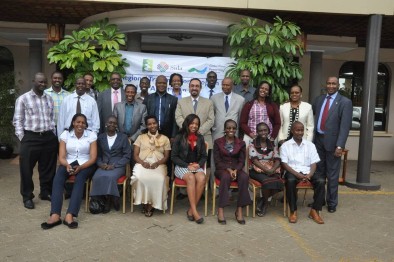GWP Eastern Africa organized a regional training workshop on the use of IWRM as a tool for effective adaptation to climate change in Nairobi, Kenya on 29 April-2 May 2013, to strengthen the capacities of various actors in the basin.
At the workshop opening, Mr. Safari Patrick underlined that "Climate change is not based on rhetoric, but a real phenomenon, ever happening. Therefore, we need to adapt measures that minimize its negative impacts. One of these measures is the use of IWRM."
The workshop was held by trainer Callist Tindimugaya who informed that climate change contributes to the deaths of nearly 400,000 people a year and costs the world more than $ 1.2 trillion, wiping 1.6 percent annually from global GDP. She also noted that due to dependence on natural ecosystem such as rain-fed agriculture alongside low adaptive mechanisms such as capacity gaps, "by 2015, around 480 million of people in Africa will face either water scarcity or stress due to climate change."
Trends of change in seasons, drought, floods, landslide escalations and cases of receding water levels for the lakes Victoria, Albert, Kyoga, Masinga Dam and lake Turkana were demonstrated to indicate the existing linkages between climate change and water insecurity in Eastern African region. The training ended with recommendations to increase advocacy for climate change financing and drawing concerted efforts towards change of negative climate change practices in Eastern and Greater Horn of Africa.
The participants were trained in the Analysis of Climate Change Impacts On Water Use Sectors, understanding the existing interactions between water and climate change impacts, techniques of assessing climate change impacts, tools for managing uncertainties, climate change negotiation process among others.
How the IWRM tool played an important role in resolving water related conflicts in Berki Water Catchment of Ethiopia was also presented as an example. The trigger for positive change in the Ethiopia’s Berki River Basin was a two-year pilot Project 2006-2008 run by GWP Eastern Africa through the Ethiopia Country Water Partnership.
